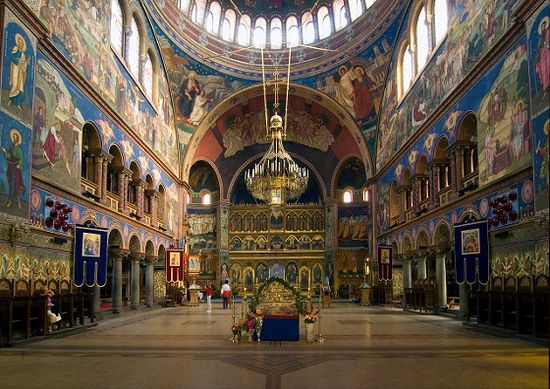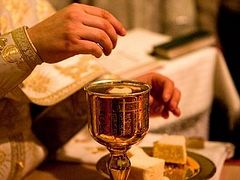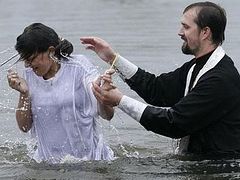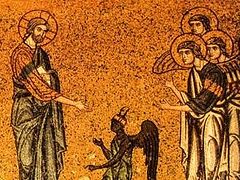Source: Growing the Church
April 20, 2016
Like oneness, goodness is one of the attributes that characterizes the Church wherever it truly exists. In general goodness is spoken of with respect to the desire, natural tendency, purpose, and perfection of some entity. That gives us four basic categories of goodness: 1) A delectable good which satisfies some desire, for example, a meal is good if its taste is pleasing or that it stills one’s hunger. We often hear that people today experience a deep spiritual hunger for a reconciliation between the unseen dimensions of reality and the everyday markers of “sacred.” Anything that seems to satisfy this desire, like prayer, music, art, or nature is thus considered good. 2) A useful good which facilitates movement toward some end. This is often called an appetite, either “sense appetite of what is apprehended as good by sense cognition” or rational appetite in regard to what is apprehended as good by intellect or reason. To this we can add a spiritual appetite that apprehends what is good, using the faculties of the soul. The good, then, is the object of the natural appetites that grow out of the overall aim of a being’s existence. In the case of human beings, sanctification or deification is what we irrepressibly desire and anything that satisfies this appetite will be apprehended as good. 3) An intrinsic good is something capable of realizing its own purpose. Thus we can say that the Church itself is intrinsically good because it already possesses everything it needs to be holy and to bring about the sanctification of its finite members, that is, to help them realize their end, God-likeness. 4) An absolute or ultimate good is an entity toward which everything else tends and in which everything is perfected. Perfection is the notion of having been fully realized or completed, an entity in which there is no longer any need of becoming. God is eternally perfect and thus absolutely good. Finite beings are perfectible, but their perfection can only take place gradually. Thus, the perfect is always good, but good is not always perfect. So how can these general ideas about goodness be mapped onto the Church? In what sense is the Church good?
Church as Absolute Goodness. If by ultimate goodness we mean that in which everything is perfected, then we can safely assert the absolute goodness of the heavenly Church because, on the one hand, it participates in the absolute goodness of God and, on the other hand, it is the perfection of all of its members. We know, of course, that God is absolute goodness (Ps 118.1, 136.1, 143.10), since he is the perfection of all things, in particular morality. So one way to capture all the perfections of God is to speak of his holiness. Indeed, that is the way in which God is presented in the Scriptures, as good and holy (Ps 25.7, 65.4, 107.8–9, Is 6.3). Since the Church exists as a pre-eternal universal in the mind of God, it is in and of God and thus it shares in the divine attributes of infinity, perfection, holiness, and goodness. This is an ontological goodness. So in this pre-eternal universal Church, which is part of God, there is no becoming, no change. It is already the completion or the perfection of what it is intended to be, it is good, it is holy. In addition to this ontological goodness there is an infinite, eternal manifestation of ecclesial perfection made up of the heavenly hosts of angels, seraphim, and cherubim who continually worship the all-holy One. To this assembly are added all the faithful as they complete their earthly journeys, that great cloud of witnesses (Heb 12.1). This heavenly assembly is the glorified Body of Christ, the Church triumphant which will worship the holy One for all of eternity. Each member is fulfilled, perfected, and wholly sanctified in the Body of Him who “For by one offering He has perfected forever those who are being sanctified” (Heb 10.14). This, then, is the ultimate destiny or telos, the gradual sanctification of the believer that is fully realized by divine agency in the eternal kingdom, the heavenly Church. So, if all human being reaches perfection in God, then God is absolute goodness. And to the extent that the heavenly Church is of God, is Christ’s body, it is by extension that same ultimate good.
The Church as Intrinsically Good. As this divine, universal Church is realized in the finite world of our experience, it serves as the context of the deification or sanctification of the faithful. The primary reason for the Church’s existence is the facilitation of communion with Christ and thereby the gradual sanctification of its earthly members. The earthly Church is given the ability and the tools with which to actualize its own purpose and, for that reason, we ascribe to the Church intrinsic goodness. Put simply, it has the power to gradually realize the holiness of its members. Of course, in the case of the Church, we are not talking about some general or impersonal force or energy, but rather [by the power]? the sanctifying work of the Holy Spirit, the Spirit of holiness (Rom 1.4). The actual manifestation of this power can be seen in the charismatic structure of ecclesial ministries (discussed in previous posts) and in the sacraments. A sacrament involves the operation of the Holy Spirit by which some earthly or creaturely substance (water and oil at baptism, oil at chrismation, wine and bread in the Eucharist, the sinner at confession, a couple at their wedding, the priest at ordination, the sick though unction) reveals God to us, makes us receptive to God, and shapes our personal relationship to God and to one another. In other words, they facilitate sanctification and holiness in the faithful. So because the Church provides the power to sanctify its members, it can be called good and holy.
The Church as Useful Goodness. Here I am speaking of goodness as that which is facilitating movement toward some end. We have already established that the end is the ultimate perfection of the believer and we have seen that the Church has the power to accomplish that end for its children. But we also need to ask what else the Church offers by way of concrete helps. To put it differently, how do Christ and the Holy Spirit facilitate the movement of the faithful toward their ultimate end? God, in his infinite wisdom, has given the Church a number of practical tools which help the faithful with the process of their own sanctification. These good and perfect gifts come down from the Father of lights (Jas 1.17–18) and include 1) the Holy Scriptures, 2) Apostolic Succession, 3) Liturgical Structures, 4) Councils (Dogma and Canons), 5) Hagiography, and 6) Iconography. All six of these gifts or tools are given to the Church in order to facilitate our movement toward holiness, toward our ultimate destiny, deification. If the Church possesses and uses these tools, then, in keeping with our discussion so far, it is a Church and it is good and holy.
The Church as Delectable Goodness. To say that the Church is good is also to say that it satisfies the desires of its members. Of course, we do not mean just any desire since some of our cravings are evil (Rom 7.8, Col 3.5), but rather desires that, when satisfied, bring spiritual pleasure because they contribute to one’s gradual sanctification. So if we are going to speak of ecclesial pleasure, we will have to qualify it by calling it a sanctifying pleasure or holy pleasure coming as the satisfaction of the desire for deification. This is possible because the faithful have entered into new life in Christ through baptism, and through chrismation they have been given the seal of the Holy Spirit. In them, the power of self-love is broken and they are on their way to becoming more and more like God in his holiness. They are now awake to the presence of God and in them there arises a natural desire for holiness and goodness. If that is the case, we can understand the appeal of the scriptural writers to wholesome, holy desires. Proverbs 11.23 tell us “the desire of the righteous is only good.” Elsewhere we are told to desire the “best gifts” (1 Cor 12.31), “prophecy” (1 Cor 14.1), “to be with Christ” (1 Pet 1.23), a godly life in Christ (2 Tim 3.12), a better, heavenly country (Heb 11.16), “the pure milk of the Word” (1 Pet 2.2), and, of course, God Himself (Ps 73.25). These things, then, and not the base desires of human self-love, are what we associate with sanctified pleasure or craving. We don’t come to the Church in order to be pleasured, to have our likes and dislikes fulfilled in the supposed beauty of its incense, its vestments, or its music, but we come to pursue holiness.
So this is what the Church is and what it is supposed to be. On earth she is still a work in progress since few of her members have been fully sanctified and perfected? However, what gives us hope is that they are capable of being finally perfected, that is, of fully realizing their holiness I moved this last phrase as it was awkward in that they have an essential perfection. So, what is visible to us now is an intermediate or accidental perfection whereby the tendency toward holiness is gradually being accomplished through the work of the Spirit in the Church. If that is the case, then we should be able to use these accidental indicators of holiness to assess the level of holiness-facilitating activities, as well as the general state of holiness in the parish and develop practical strategies for becoming more holy.




